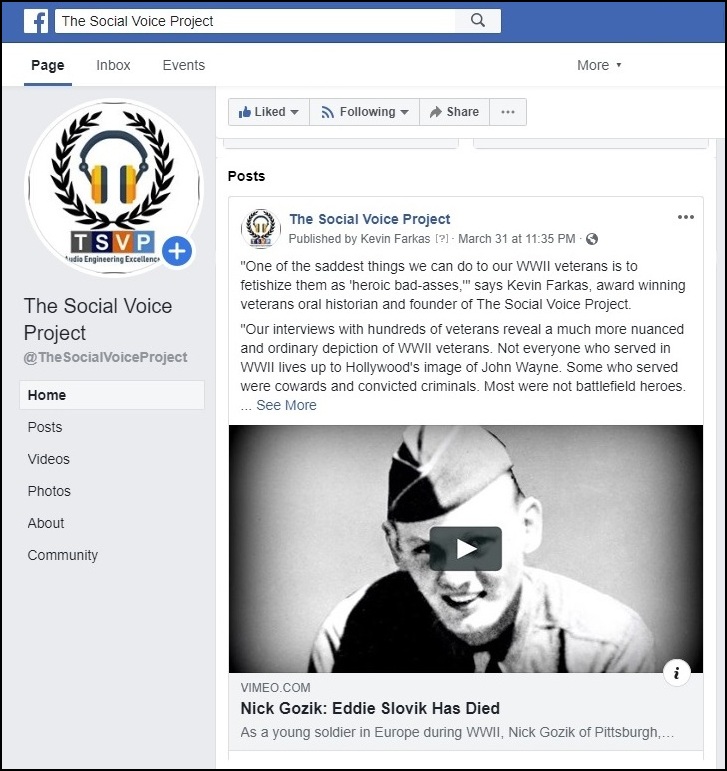Gallery with alias: PUBLIC_HISTORY_BLOG_POSTS not found

Most people want to learn the truth about history, even if it rattles common sense or deflates comfortable–but dubious–accounts of history.
We recently posted a provocative mini-essay about a particular populist conception of WWII veterans–that they were all heroes. Of course, many were. Some, if we are to be truthful with ourselves, were not.
During WWII, one third of all criminal court cases in the entire US were military courts-martial. That’s 1.7 million cases trying WWII GIs for criminal conduct.
In fact, the US military executed 102 GIs, mostly for the rape and murder of civilians.
Only one American GI was executed for desertion, and that was army private Eddie Slovik, the subject of the media short produced by Kevin Farkas of The Social Voice Project.
We anticipated that our thought-provoking public history blog post would get some degree of condemnation from those who, as we mention in our essay, tend to “fetishize” all WWII veterans as heroes. Our view, based on oral histories we’ve conducted and studied, a wide range of scholarly histories of WWII, and the criminal statistics cited above, is that not all WWII veterans were heroes.
It is, for sure, a controversial statement to make and an admitted generalization. But it stands counterpoint to the blanket assumption that all GIs acted honorably, morally, and heroically during WWII. As a society, it pains us to admit this, so we rarely do. Instead, we push down certain truths about WWII–all wars–that taint our desired perceptions and cultural mythologies.
So how did the public react to our post? One person took offense and unfollowed us on Facebook. We also gained 45 new followers.
READ OUR ORIGINAL POST
“Our interviews with hundreds of veterans reveal a much more nuanced and ordinary depiction of WWII veterans. Not everyone who served in WWII lives up to Hollywood’s image of John Wayne. Some who served were cowards and convicted criminals. Most were not battlefield heroes. After the war, many found solace in work, alcohol, drugs, and forgetting the inhumanity they were forced to endure on the battlefield.”
The true story of Private Eddie Slovak disrupts our tendency to hero-worship anyone who served during WWII, especially the officers who sometimes made wrong decisions. These were human beings unavoidably caught up in the circumstances of the time. Sometimes they got it wrong.
“In our experience as oral historians, elderly veterans are not apt to recall their mistakes,” Farkas says. “The general public may not want them to. We’re comfortable with softening history. We’re all too comfortable perpetuating the myth that all WWII veterans are heroes. In reality, they are not.”
This media short produced by Kevin Farkas reminds us that history is not always unilateral. It is always under interpretation, as it should be.
Was the execution of Private Eddie Slovik “justice or legal murder?” asks Nick Gozik, eyewitness to the firing squad. Was Slovik a hero? Some believe so. You decide.
“Our interviews with hundreds of veterans reveal a much more nuanced and ordinary depiction of WWII veterans. Not everyone who served in WWII lives up to Hollywood’s image of John Wayne. Some who served were cowards and convicted criminals. Most were not battlefield heroes. After the war, many found solace in work, alcohol, drugs, and forgetting the inhumanity they were forced to endure on the battlefield.”
The true story of Private Eddie Slovak disrupts our tendency to hero-worship anyone who served during WWII, especially the officers who sometimes made wrong decisions. These were human beings unavoidably caught up in the circumstances of the time. Sometimes they got it wrong.
“In our experience as oral historians, elderly veterans are not apt to recall their mistakes,” Farkas says. “The general public may not want them to. We’re comfortable with softening history. We’re all too comfortable perpetuating the myth that all WWII veterans are heroes. In reality, they are not.”
This media short produced by Kevin Farkas reminds us that history is not always unilateral. It is always under interpretation, as it should be.
Was the execution of Private Eddie Slovik “justice or legal murder?” asks Nick Gozik, eyewitness to the firing squad. Was Slovik a hero? Some believe so. You decide.
This post is inspired by the creative media short, “Nick Gozik: Eddie Slovik Has Died,” created by Kevin Farkas of The Social Voice Project for the Veterans Breakfast Club.
PUBLIC HISTORY MATTERS
At The Social Voice Project, we celebrate history and people through our community oral history projects that give us a chance to look, listen, and record the voices and stories of our time. We encourage all local historical societies and museums to capture, preserve, and share their communities’ lived experiences, memories, customs, and values. Future generations are depending on it.
Contact TSVP to learn more about our commitment to public history and community oral history projects.

You must be logged in to post a comment.